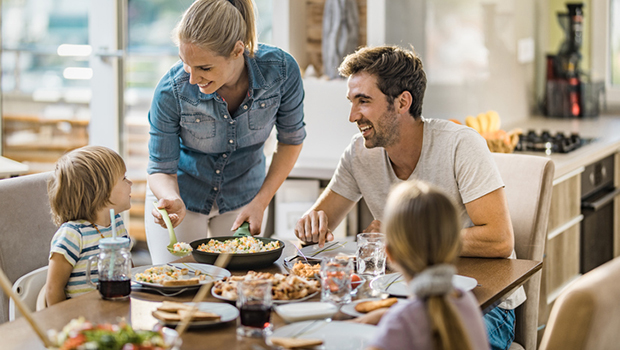
With packed schedules for both kids and parents these days, it's all too easy for family dinner to go on the backburner.
And though a seated family dinner can't happen every single night–we're only human after all!–research suggests that sharing dinner together should be a top priority for all families. From increased academic performance to higher self-esteem, kids tend to be happier and healthier when they experience regular family meals.
The Benefits of Eating Together
The Family Dinner Project is leading the charge for a return to nightly family dinners, and it's a great online resource for familiarizing yourself with the many benefits.
Most notable among these benefits are increased emotional health. Children who participate in family dinners experience greater self-esteem, have higher resilience (an ability to bounce back from life's setbacks) and a lower risk of depression. These children also experience increased academic performance in the classroom.
But it's not just young kids who see a big payoff. Family dinners are especially important for adolescents and teens. Young adults who share dinner with their families experience lower risk of teen pregnancy, lower likelihood of developing eating disorders and--one of the most studied benefits--a lower risk of substance abuse.
According to a study from Columbia University, teens who have infrequent family dinners (fewer than three per week) are more than twice as likely to say that they expect to try drugs in the future compared to teens who have frequent family dinners (about five to seven per week).
Furthermore, family dinners are also great for physical health. Children who partake in family dinners have a lower rate of obesity and eat more fruits and vegetables.
A Chance to Bond
Why is the simple act of sharing a meal so impactful? Put simply, family dinners increase the overall well-being of kids while also nurturing the bonds within the family.
For example, researchers have found that when families have dinner together, children experience a boost in mood and go on to have better developmental skills, including the ability to set and respect boundaries, receive and give support and maintain a positive self-identity.
Kids also experience stronger high-quality relationships with their parents when they eat dinner together night after night. This is especially crucial as kids reach adolescence since parental engagement has long been shown to be the greatest influence on whether teens will choose to use substances such as alcohol, tobacco and other drugs in high school.
Tips for Starting a Family Dinner Routine
If you would like to share more family dinners, there are plenty of resources to get you started, including the Family Dinner Project's 4 Weeks to Better Family Dinner. This free online program tackles family dinner from every angle, including easy, fast and healthy recipes, topics to talk about with your kids and ways to make the experience enjoyable for everyone.
Other helpful tips include:
No electronics at the dinner table. This includes a television in the background. Technology discourages family interaction and should be kept away during this time–no exceptions. As a parent, make sure to model this behavior too.
Let the fun start before dinner! Children will be more engaged at the table if you involve them beforehand. Whether it's washing produce or setting the table, show them they are a part of putting the meal together. This can also teach them about responsibility and improve their cooking skills.
Leave negative food talk behind. Studies have shown that restrictive behavior in parents may actually increase a child's weight. Be careful about what you say at the dinner table, and stay away from negative talk about food and their bodies.
Have a few conversation starters ready to go. If you're new to family dinners, they can feel a little forced at the beginning. This is normal! Come to the table with a few questions to ask, and don't put pressure on the resulting conversation. As long as the family members are engaging with each other, kids will reap the benefits.









Discuss This Article